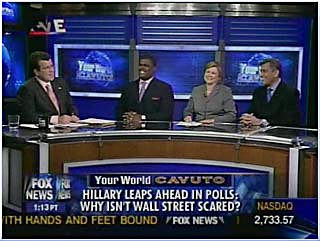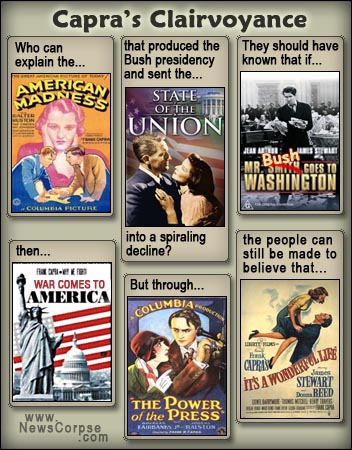Who knew that the Roman Catholic Church observed something called “World Communications Day”? Well they do, and the theme for the 42nd annual observance to be held on May 4, 2008, was addressed in a speech by Pope Benedict XVI. He had some interesting things to say about the media. To begin with he recognizes the massive shadow cast by modern media conglomerates.
“Truly, there is no area of human experience, especially given the vast phenomenon of globalization, in which the media have not become an integral part of interpersonal relations and of social, economic, political and religious development.”
He goes on to warn that the media’s potential for positive contributions in society can be undermined by their basest tendencies, and that they…
“…risk being transformed into systems aimed at subjecting humanity to agendas dictated by the dominant interests of the day. This is what happens when communication is used for ideological purposes or for the aggressive advertising of consumer products.”
He is starting to sound like a fairly radical advocate for reform. He introduces the notion of “info-ethics” that, like bio-ethics, would serve as a guide in the practice of principled journalism. But he isn’t through yet.
“We must ask, therefore, whether it is wise to allow the instruments of social communication to be exploited for indiscriminate ‘self-promotion’ or to end up in the hands of those who use them to manipulate consciences. Should it not be a priority to ensure that they remain at the service of the person and of the common good…”
Well that settles it. The Pope has fallen in with the subversives who are calling for a wholesale restructuring of media’s place in society. A key goal of reformers is to insure that the media does not “end up in the hands” of manipulators and those who fail to acknowledge an obligation to the public interest. And if that’s not enough, tell me that this isn’t a slap at Fox News:
“Today, communication seems increasingly to claim not simply to represent reality, but to determine it, owing to the power and the force of suggestion that it possesses.”
Alright, maybe I’m reading a bit too much into that, but if I had presented it as a quote from Bill Moyers or Bob McChesney, it would have been entirely believable. The same would be true for the following:
“The media must avoid becoming spokesmen for economic materialism and ethical relativism, true scourges of our time. Instead, they can and must contribute to making known the truth about humanity, and defending it against those who tend to deny or destroy it.”
I couldn’t have said it better myself. It’s great to see a mainstream spiritual leader like this articulate an agenda that is so anti-materialism and pro-truth. I wonder if the faithful will get behind these ideas and pursue, with a missionary zeal, the reform of a system that demeans humanity and freedom of thought and will.


 When asked what their “single greatest economic worry is for 2008,” did they choose recession, or sub-prime loans, or the national debt, or oil prices, or the trade deficit, or the falling value of the dollar? Of course not. The thing these elitist moneychangers fear the most is a Democrat in the White House. They are so consumed with their own partisan, selfish greed that 22% of them consider a president elected by the American people to be worse than even a terrorist attack, which was only chosen by 13%. To compound the extremism of their blind self-interest, 81% of them also cited a capital gains tax increase as their greatest tax concern. That shouldn’t really come as a surprise to the vast majority of Americans who pay only income taxes. The ruling class is always angling for the tax burden to be further shifted to ordinary citizens.
When asked what their “single greatest economic worry is for 2008,” did they choose recession, or sub-prime loans, or the national debt, or oil prices, or the trade deficit, or the falling value of the dollar? Of course not. The thing these elitist moneychangers fear the most is a Democrat in the White House. They are so consumed with their own partisan, selfish greed that 22% of them consider a president elected by the American people to be worse than even a terrorist attack, which was only chosen by 13%. To compound the extremism of their blind self-interest, 81% of them also cited a capital gains tax increase as their greatest tax concern. That shouldn’t really come as a surprise to the vast majority of Americans who pay only income taxes. The ruling class is always angling for the tax burden to be further shifted to ordinary citizens. The people’s voice is already being lost in the din of propagandists like Rupert Murdoch who now owns the daily Bible of these market mavens, the Wall Street Journal, as well as his own disinformation vehicle on cable TV, the Fox Business Network. FBN was launched with the promise that it would a more
The people’s voice is already being lost in the din of propagandists like Rupert Murdoch who now owns the daily Bible of these market mavens, the Wall Street Journal, as well as his own disinformation vehicle on cable TV, the Fox Business Network. FBN was launched with the promise that it would a more 


 In
In 
 The
The